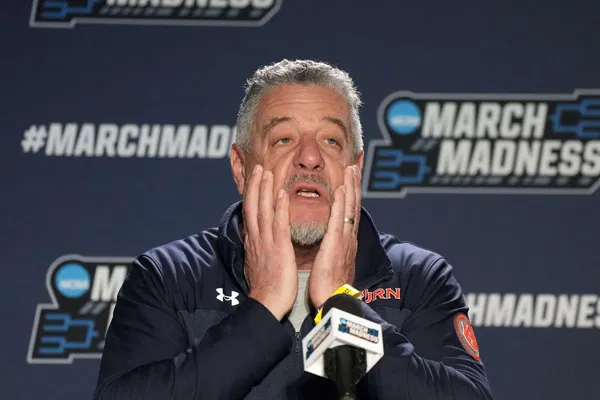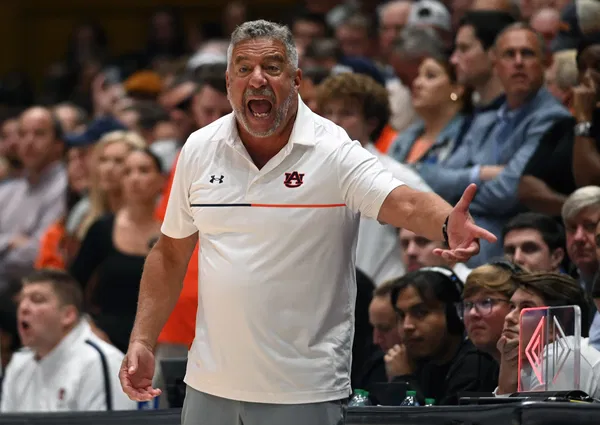Auburn basketball is riding high after an impressive victory over last year’s NCAA runner-up, Purdue, but head coach Bruce Pearl remains cautious. The Tigers’ first-round loss to Yale in the 2024 NCAA Tournament served as a harsh reminder for Pearl, who recognizes the challenges of building a consistently dominant program. Despite Auburn’s 11-1 record and a current No. 2 ranking, Pearl acknowledges that this year’s team differs significantly from last year’s, and he has mixed feelings about the changes.

Reflecting on College Basketball
In an appearance on The Field of 68: After Dark, Pearl discussed his experiences coaching students over the years and how he has influenced their growth both on and off the court. When asked by host John Fanta about the current state of college basketball, Pearl expressed his appreciation for how student-athletes are now being compensated through NIL (Name, Image, and Likeness) deals. He remarked, “There’s nothing wrong with college basketball. The kids still wanna be coached, they wanna be held accountable, they wanna get their degrees. What a blessing they’re finally able to be compensated for what they’re worth. We’ve graduated 43 kids at Auburn the last 10 years.”

While Pearl supports NIL, he admitted to having frustrations unrelated to player compensation. One key concern is the difficulty of recruiting, particularly as the transfer portal reshapes the college basketball landscape. He reflected on how Auburn has lost several players to other programs, forcing him to rebuild his roster.
The Challenges of Recruiting in the Transfer Portal Era
Over the past year, Auburn has seen three players—KD Johnson, Tre Donaldson, and Aden Holloway—leave through the transfer portal. Each departure came with unique circumstances. Johnson, a backup shooting guard behind Denver Jones, sought more playing time. Pearl supported Johnson’s decision, acknowledging that “there’s only so many minutes, only so much opportunity.”
Holloway, a former five-star recruit known for his shooting ability, struggled to adapt his game to the college level, including scoring and finishing around the rim. Meanwhile, Donaldson, who played both basketball and football in high school, shifted his focus entirely to basketball. After two seasons at Auburn, he transferred to Michigan, where he continues to pursue his basketball career.
Despite these challenges, Auburn remains a top-tier team, consistently ranked in the top three. However, Pearl has expressed a desire to retain more of his players, especially those with significant potential. He believes the constant turnover makes it difficult to build continuity and develop a cohesive team.
A Silver Lining: KD Johnson’s Return to Auburn
While Johnson left Auburn to play at George Mason, he has expressed a desire to return to Auburn in the future—not as a player, but to complete his degree. Pearl noted in March, “KD Johnson will return to Auburn to receive his degree when the time comes. He’s really close to his degree, and he perhaps could go someplace else and maybe get that degree in this next year. But he really wants to be a unit short. He wants an Auburn degree. So does his family. When he’s done playing wherever he goes and plays, we’re going to make that happen.”
This sentiment highlights Pearl’s commitment to his players’ long-term success, both on and off the court. While he may prefer to recruit and retain top prospects, he also prioritizes their educational achievements and personal growth.
Looking Ahead
Bruce Pearl’s frustrations with recruiting reflect broader challenges in the current college basketball environment, particularly with the influence of the transfer portal. While Pearl supports the benefits of NIL, he faces the ongoing task of balancing player development with the realities of roster turnover. Despite these hurdles, Auburn’s strong record and consistent rankings demonstrate that the program remains a force to be reckoned with.
Pearl’s ability to navigate these challenges and adapt to the evolving landscape of college basketball will determine whether Auburn can sustain its success and continue to compete at the highest level.